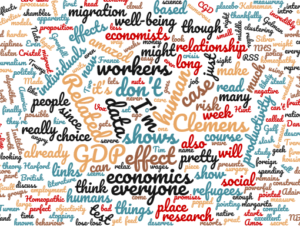Hi all,
Since the third test of the England – South Africa test has yet to start, and the NBA Summer League has already finished, I’m struggling for an interesting intro to this week’s links (this reflects my general struggle in conversation: how to interact with people when there’s no cricket or basketball to talk about, especially when economics is cordoned off for separate discussion). My normal strategy in a social situation would be to find the bar, but I think that might be against the Civil Service code. So straight into the links this week:
- It’s no secret that GDP doesn’t measure everything that matters for human well-being, and it’s also pretty well known that measuring productivity in an economy is incredibly difficult. Most economists more or less ignore both of these facts most of the time, but this excellent piece by Adair Turner has a go at working through the implications, or at least one set of them. He points out that many of the things that do most to improve human happiness these days don’t show up in GDP, but lots of zero-sum activities (like chasing criminals who don’t produce anything new but steal what has already been produced) do. He suggests that this is increasingly becoming the case in developed countries (an important qualification) and GDP and productivity could become irrelevant as indicators of well-being.
- Of course, we could always automate policing or defence, and since everyone seems to be bricking themselves at the prospect of being replaced by machines, maybe that’s coming? I don’t buy these visions of mass robot-induced indolence and neither do Acemoglu and Restrepo on VoxDev, who point out that not only have previous robot-terrors failed to come to fruition, there are good economic reasons to suggest that their influence on workers will be restrained. And secondly, another recent paper shows that once you examine automation risk at the task-level, the number of jobs genuinely at risk from the new wave of robots is much smaller than previously estimated. Related, this brilliant feature on 538 looks at how algorithms and AI processes that learn based on information mediated in some way by humans can be as biased as humans.
- The best thing about Michael Clemens’ research is that even though he has a clear opinion on the value of migration (and its moral worth), he never lets this cloud the objectivity of the research he presents on it. Clemens and Hunt look at the literature on the effects of refugees on ‘native’ employment and wages, and where the data shows no effect, they make that case; but in the study where they think the data really does show a small negative effect (refugees in France, in 1962) they make that case too. Over at CGD, Clemens also shows how promises to slash legal migration will be a lose-lose proposition for the US. Of course, Trump might not care, so long as he can relax the rules for long enough for his resorts to hire foreign workers – right in the middle of ‘Made in America’ week. Related: Vox on how the Gulf crisis is likely to have severe effects on its (numerous) migrant workers.
- I read this a few weeks ago, but it just popped up again on my RSS feed, and it deserves to be read by as many people as possible. Tim Harford goes nuts and gets angry at just about everyone in sight after Grenfell, pointing out what a complete shambles UK housing policy is.
- Psychology and economics have had a fruitful relationship ever since Amos Tversky and Daniel Kahneman politely pointed out that rational choice theory is a very bad description of human behaviour. It was (and remains) an easy discipline to listen to for economists, because it’s based in large part on individual choice and behaviours and economics typically models representative units (individuals or firms). Disciplines that place more weight on social constructs and the relationship between individuals and these groups are a harder sell, as Andrew Gelman starts to discuss here.
- Two things: I’m amazed the NHS was spending money on homeopathy in the first place (they’re stopping, thankfully). And I am really not amazed that the head of the British Homeopathic Institute is called Cristal. Related: apparently, surgery has a pretty powerful placebo effect.
- And finally, though I can’t go for the booze in my job, Nate Silver and co did so in the name of science and data journalism, looking for the perfect margarita using a k-means clustering algorithm. Even I’m not that much of a geek.
Have a great weekend, everyone!
R

